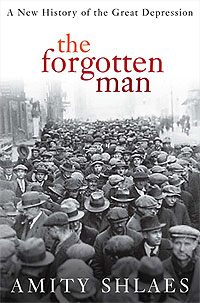 Every so often I like to recommend a book. I’m about halfway through The Forgotten Man: A New History of the Great Depression by Amity Shlaes. Although I haven’t yet completed it, based on what I have read up to now, and on the numerous positive reviews of the book, I am confident I can recommend it without concerns that I will have to retract that recommendation by the time I have finished it.
Every so often I like to recommend a book. I’m about halfway through The Forgotten Man: A New History of the Great Depression by Amity Shlaes. Although I haven’t yet completed it, based on what I have read up to now, and on the numerous positive reviews of the book, I am confident I can recommend it without concerns that I will have to retract that recommendation by the time I have finished it.
Some of you, I know, may be reluctant to tackle a book dealing with the Depression. All that economics, all that . . . well . . . depressing stuff! Shlaes, though, manages to cover all the “stuff” in a most interesting way by focusing on people.
She carries forward the stories of a number of individuals—both those who worked for the New Deal and those who suffered from it—so that you don’t feel as if you are bogged down in an economic treatise. In effect, she personalizes what some authors have turned into impersonal events. She tells a good story. History should be a story about people who are affected by the times they live in.
Her storyline is that the New Deal did not accomplish what its defenders claim it did—it most assuredly did not bring the nation out of the Great Depression. The old liberal mantra that FDR ended the Depression has been under siege for quite some time, and deservedly so. Recently, President Obama commented [and I’m paraphrasing here because I cannot find his exact words] that there is no debate on the effectiveness of the New Deal, indicating that he believes it was a success. If he truly believes there is no debate, he is woefully uninformed.
The Forgotten Man makes it clear that the debate is real, and that the weight of the evidence is against the liberal interpretation.
